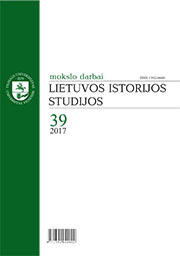VAIKO IR VAIKYSTĖS SAMPRATOS IR JŲ KŪRIMAS VIEŠAJAME VĖLYVOJO SOVIETMEČIO LIETUVOS PEDAGOGINIAME DISKURSE (1962–1984)
PERCEPTIONS OF CHILDREN AND CHILDHOOD IN THE PUBLIC PEDAGOGICAL DISCOURSE OF THE LATE SOVIET PERIOD IN LITHUANIA (1962–1984)
Author(s): Rūta GrišinaitėSubject(s): Vocational Education, Educational Psychology, Post-War period (1950 - 1989)
Published by: Vilniaus Universiteto Leidykla
Keywords: Soviet pedagogy; Soviet educational psychology; childhood; perception of a child; late Soviet period;
Summary/Abstract: This article analyzes what perceptions of children and childhood were offered in the public pedagogical discourse of the late Soviet period in Lithuania (1962–1984), whether these perceptions are created only in the pedagogical idea of Soviet Lithuania or are they receptive to the changes of Soviet pedagogy and educational psychology in all of the former Soviet Union. The research shows that children, in the pedagogical discourse of the late Soviet period in Lithuania, were perceived as psychologically complex, consciously involved in the educational process and requiring a personalized approach to their upbringing. All these perceptions were common to the late Soviet pedagogical theory in Soviet Russia. The popularization of the concept of vocational education in Soviet pedagogy in the sixties also had influence on hyperbolizing childhood as a place and time of preparation for adult life. Finally, the article aims to reveal how pedagogy reconceptualizes the perception of normally/abnormally behaved children and whether this approach offers the image of a totally integrated or rehabilitated child that has either psychological or social problems. The last chapter of the article also tries to prove that the late Soviet pedagogical discourse steps back from the “happy Soviet childhood” and shows a more complex and layered image of Soviet childhood.
Journal: Lietuvos istorijos studijos
- Issue Year: 2017
- Issue No: 39
- Page Range: 84-104
- Page Count: 21
- Language: Lithuanian

